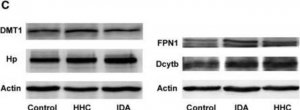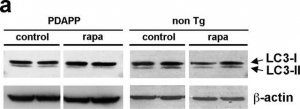- Производитель:
- Sigma-Aldrich
| NACRES: | NA.41 |
| Кат. номер |
| A3853-200UL |
| A3853-100UL |
| A3853-25UL |
The antibody recognizes an epitope located on the C-terminal end of actin conserved in all actin isoforms. It specifically labels actin in a wide variety of tissues and species. The epitope recognized by the antibody is resistant to formalin-fixation and paraffin-embedding. Zinc-formalin, B5, ethanol, methacarn, Brunnels or Bouins solutions may also be used as fixatives.
Monoclonal Anti-Actin (mouse IgG2a isotype) is derived from the AC-40 hybridoma produced by the fusion of mouse myeloma cells and splenocytes from an immunized mouse. A synthetic actin C-terminal peptide, attached to Multiple Antigen Peptide (MAP) backbone was used as the immunogen. The isotype is determined using Mouse Monoclonal Antibody Isotyping Reagents, Catalog No. ISO2
The antibody recognizes an epitope located on the C-terminal end of actin conserved in all actin isoforms. It specifically labels actin in a wide variety of tissues and species. The epitope recognized by the antibody is resistant to formalin-fixation and paraffin-embedding. Zinc-formalin, B5, ethanol, methacarn, Brunnel′s or Bouin′s solutions may also be used as fixatives.
Specificity
Cross-reaction of monoclonal Anti-Actin antibody has been observed with human, bovine, sheep, goat, pig, rabbit, dog, mouse, rat, guinea pig, hamster, chicken, carp, viper, frog and snail. The antibody may be used in staining of methanol-fixed, frozen sections.
Western blot analysis of MDCK cell lysates were performed using monoclonal anti-actin antibody as a primary antibody.
Mouse monoclonal anti-actin antibody can be used for western blot assays. Furthermore, the product can also be used for immunocytochemistry (10-20µg/mL, using chicken or human fibroblasts by methanol/acetone fixation), microarray, immunohistochemistry and indirect ELISA.
Monoclonal Anti-Actin antibody produced in mouse has been used in the detection of actin in human bronchial epithelial cells using immunohistochemical assays. It has also been used in immunofluorescence detection in cardiomyocytes.
Packaging
200 μL in glass insert
Biochem/physiol Actions
Actin and myosin are constituents of many cell types and are involved in cellular process including locomotion, secretion, cytoplasmic streaming, phagocytosis, and cytokinesis. The N-terminal region of actin appears to be a major antigenic region, and may be involved in the interaction of actin with other proteins such as myosin. Among the six isoforms of actin, four of them represent the differentiation markers of muscle tissues and two are found practically in all cells. There are three -actins (skeletal, cardiac, and smooth muscle), one -actin (-nonmuscle), and two -actins (-smooth muscle and -nonmuscle). Actin isoforms show >90% overall sequence homology, but only 50–60% homology in their NH2-terminal residues.
The actin in cells of various species and tissues are very similar in their immunological and physical properties characterized by electrophoresis and amino acid sequence analysis. They mediate cytoskeletal remodeling during T cell activation. Mutation in the -actin and -actin gene is associated with a developmental disorder called Baraitser-Winter syndrome. Mutation in the -actin leads to hearing loss.
Physical form
Solution in 0.01 M phosphate buffered saline, pH 7.4, containing 15 mM sodium azide.
Storage and Stability
For continuous use, store at 2-8 °C for up to one month. For extended storage, freeze in working aliquots. Repeated freezing and thawing is not recommended. Storage in “frost-free” freezers is not recommended. If slight turbidity occurs upon prolonged storage, clarify the solution by centrifugation before use. Working dilution samples should be discarded if not used within 12 hours.
Unless otherwise stated in our catalog or other company documentation accompanying the product(s), our products are intended for research use only and are not to be used for any other purpose, which includes but is not limited to, unauthorized commercial uses, in vitro diagnostic uses, ex vivo or in vivo therapeutic uses or any type of consumption or application to humans or animals.
| Quality Level | 200 |
| biological source | mouse |
| antibody form | purified from hybridoma cell culture |
| antibody product type | primary antibodies |
| clone | AC-40, monoclonal |
| form | buffered aqueous solution |
| packaging | antibody small pack of 25 μL |
| application(s) | immunocytochemistry: 10-20 μg/mL using chicken or human fibroblasts by methanol/acetone fixation, immunohistochemistry: suitable, indirect ELISA: suitable, microarray: suitable, western blot: 0.5 μg/mL using chicken or human fibroblasts |
| conjugate | unconjugated |
| shipped in | dry ice |
| storage temp. | −20°C |
| Personal Protective Equipment | Eyeshields, Gloves, multi-purpose combination respirator cartridge (US) |
| RIDADR | NONH for all modes of transport |
| WGK Germany | WGK 2 |
| Flash Point F | Not applicable |
| Flash Point C | Not applicable |
Получите коммерческое предложение в течение 1 часа
Менеджер подготовит коммерческое предложение и позвонит, если понадобится уточнить детали вашего заказа

С 2010 года мы поставляем оборудование с заводов Европы. Берем на себя все — от подбора оборудования до внедрения на предприятии

Все сотрудники имеют высшее образование, закончили ведущие химические вузы страны, такие как РХТУ им Менделеева.

У большинства компаний срок ожидания составляет 10-12 недель.

Оборудование хранится на сухом отапливаемом складе, где поддерживается ровная температура.

Работаем с PonyExpress и Деловыми линиями. Вы также можете выбрать свою транспортную компанию или забрать товар со склада в Москве.

В случае любых неполадок за свой счет выполним ремонт в сервисном центре или на заводе-изготовителе. Или бесплатно заменим прибор на новый.

Производим пуско-наладку оборудования, валидацию, обучение сотрудников. Если нужно, привлекаем инженеров с заводов- изготовителей.











































































































































